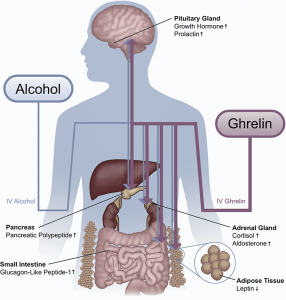Featured Paper of the Month – July 2021
 Published in International Journal of Neuropsychopharmacology by Mehdi Farokhnia and Lorenzo Leggio, et al. in the NIDA IRP Clinical Psychoneuroendocrinology and Neuropsychopharmacology Section.
Published in International Journal of Neuropsychopharmacology by Mehdi Farokhnia and Lorenzo Leggio, et al. in the NIDA IRP Clinical Psychoneuroendocrinology and Neuropsychopharmacology Section.
Summary
Evidence from preclinical and clinical studies suggest that the orexigenic hormone ghrelin modulates alcohol-seeking behaviors. Accordingly, the ghrelin system is being studied as a potential pharmacotherapeutic target for alcohol use disorder (AUD). Both ghrelin and alcohol interact with a variety of endocrine pathways, especially those related to appetite, metabolism, and stress. To better understand the complex interplay between ghrelin and other hormones in the context of alcohol use, the present study examined neuroendocrine response to a supraphysiological challenge with exogenous ghrelin, combined with alcohol, in a clinically relevant sample of heavy-drinking individuals with AUD. Results found that intravenous ghrelin, compared to placebo, increased blood concentrations of glucagon-like peptide-1, pancreatic polypeptide, cortisol, and prolactin, both acutely and during the whole session. Lower levels of leptin and higher levels of aldosterone were also found during the ghrelin vs placebo session. This study provides a comprehensive picture of neuroendocrine response to ghrelin plus alcohol and provides a deeper insight into the interplay between ghrelin and appetitive, metabolic, and stress-related hormones in the context of alcohol use.
Publication Information
In: International Journal of Neuropsychopharmacology, 2021, ISSN: 1461-1457, (pyab004).
